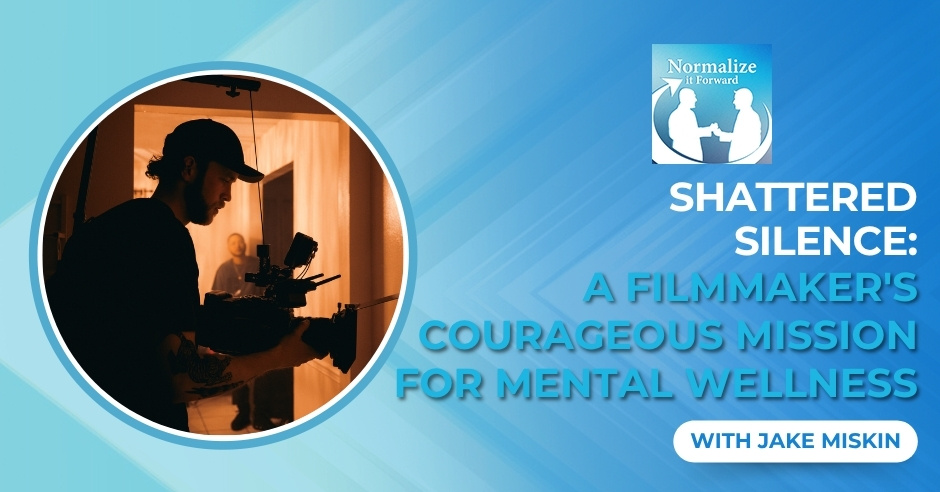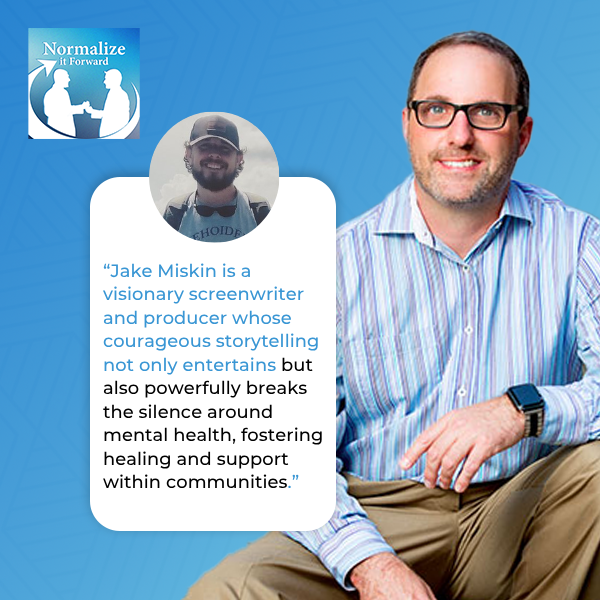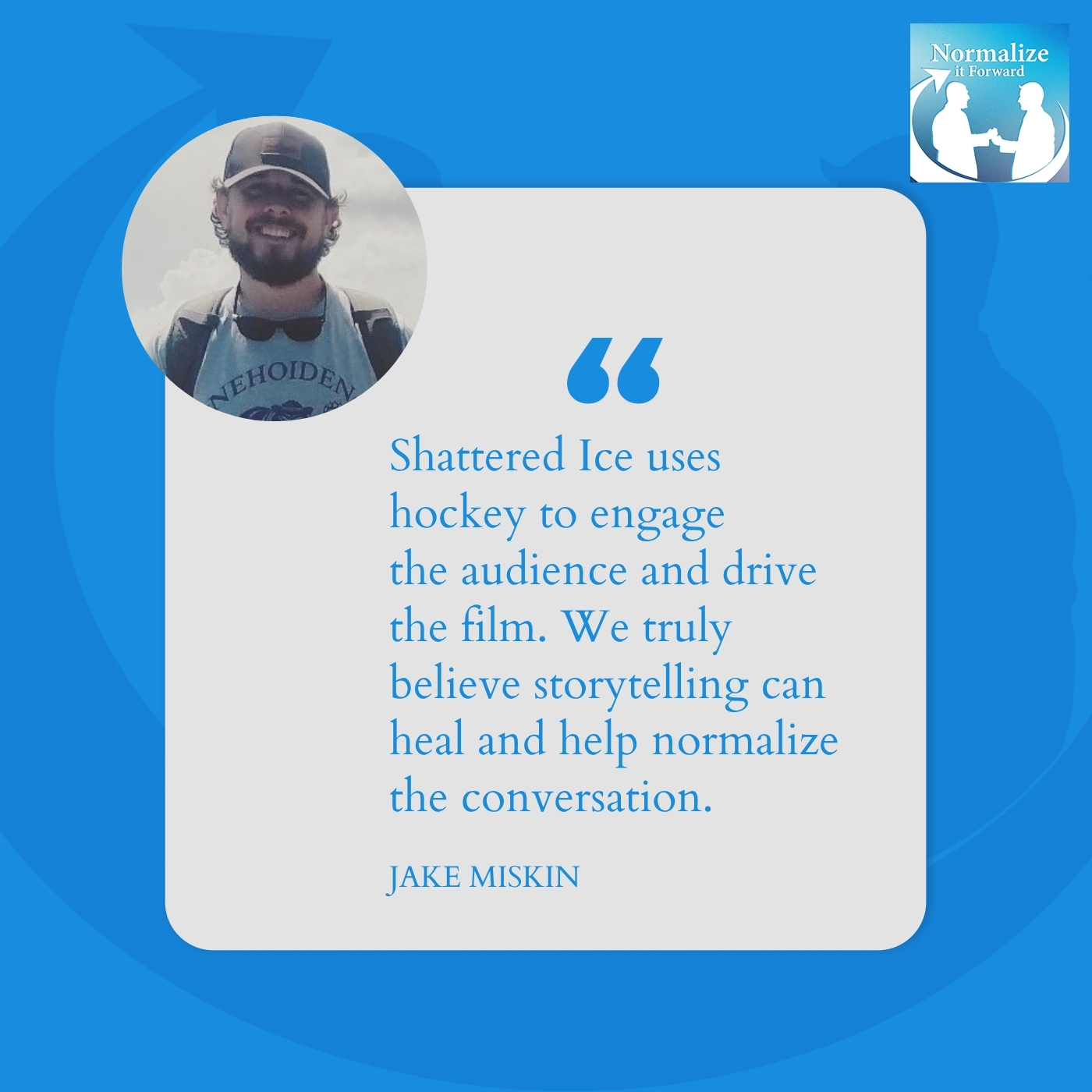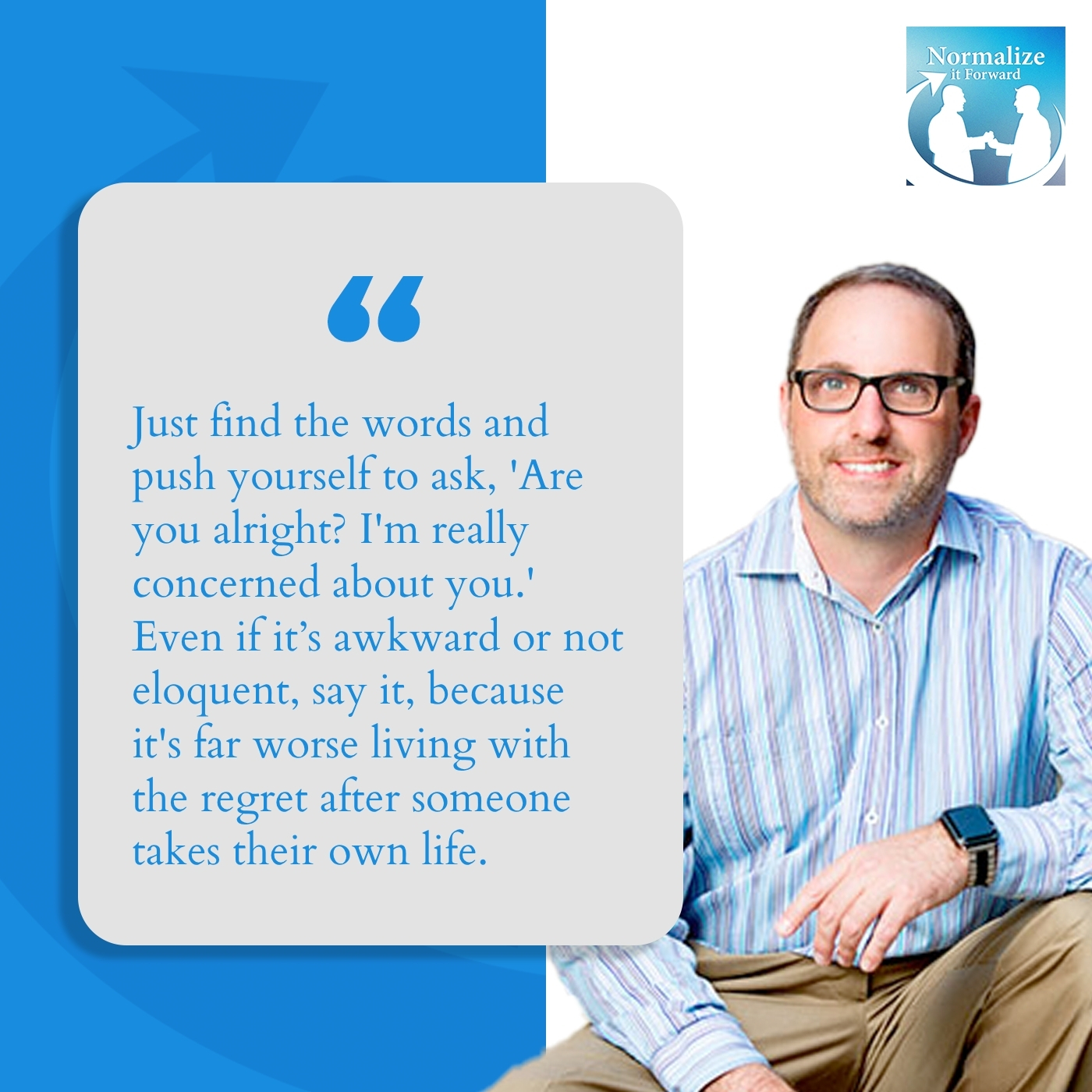
Ever wondered how personal tragedy can ignite a powerful movement for change? Join us as we welcome Jake Miskin, the visionary screenwriter and producer behind the critically acclaimed film, Shattered Ice. Inspired by the heartbreaking loss of classmates to suicide during his own youth, Jake channeled his grief into a compelling narrative that tackles the unspoken complexities of mental health and community healing. In this profound conversation, Jake shares the deeply personal journey that led to Shattered Ice, a film designed to spark crucial dialogue, especially among young adults and athletes. Discover how storytelling can be a powerful tool for connection and why breaking the silence around mental health is more vital now than ever before.
Reading about mental health is hard. Let’s schedule a free consultation.
—
Watch the episode here
Listen to the podcast here
Shattered Silence: A Filmmaker’s Courageous Mission For Mental Wellness With Jake Miskin
I am so excited to welcome to the show, Jake Miskin. Jake, how are you, sir?
I am good. Thank you for having me.
Thanks for being here, Jake. Jake is a Screenwriter and Producer, best known for his debut film, Shattered Ice. Born and raised in Needham, Mass., Miskin attended Needham High School, where he experienced firsthand the tragic loss of multiple classmates to suicide during his teenage years. These personal experiences deeply influenced his decision to create Shattered Ice, a film that delves into the complexity of grief, mental health, and community resilience.
Shattered Ice premiered at the Sedona International Film Festival and won the Most Impactful Film award. Through Shattered Ice, Jake Miskin seeks to break the silence surrounding mental health issues, particularly among young adults and young athletes, and to inspire communities to engage in a meaningful dialogue that fosters healing and support. Jake, welcome in. How are you?
I am good. What an intro that was. Thank you.

I’m excited to hear about it. It’s so funny, whenever I read intros, everybody responds the same way. They’re like, “Is that me?”
I was like, “I don’t know if that was me they’re talking about.”
Why don’t we just jump in? Tell us a little bit about Shattered Ice, how it came about, and obviously, how we can view it.
Normalizing Mental Health Conversations Through The Power Of Storytelling
Yeah. Shattered Ice is a feature film. It’s about 100 minutes. It’s about the impact of losing someone to suicide at a young age in the conversations that young men, young boys in particular, are trying to navigate or questioning or wondering how to have these conversations. The journey it takes that it takes a village and a community to come together to realize communication really hopes that it normalizes the conversation. Shattered Ice uses hockey as the way of entertaining the film and the audience. We truly believe that storytelling could heal and again, normalize the conversation.
I love the concept. You guys, in many ways, you’re doing similar things to normalize it forward, just bringing topics out around mental health and wellness that are hard to talk about. Let’s face it, even the word suicide, people don’t like using that word. People don’t like talking about the topic. It’s one of those things that’s out there in our community, and we don’t have a choice whether we address it or we don’t address it. It’s still out there in our community. Let me go back for a minute, because your inspiration around this sounds like it had a lot to do with your own growth as a youngster in Needham. Tell us a little bit about that, Jake.
Personal Inspiration & The Avoidance Of “Why” In Grief
Yeah, when I was in high school, we lost multiple students to suicide, classmates of ours in the community and everything. There was just a real dark cloud over that time. Even after graduation, there was multiple deaths after that as well. It really hit our family hard, and me, personally. Writing this really helped with my grieving process and creating stories and characters and a world where this could be told. Friday Night Lights, the show, was a big inspiration as well of how deep they highlighted a community, and that’s what I want to do with hockey and highlighting my experiences and conversations that I was trying to have growing up.
Pay attention to those around you. Check in with everyone and have real, meaningful conversations. Share on XYeah. I’m, first of all, so sorry for all of the losses you endured. It sounds like your community was hit really in a severe fashion, and I can only imagine. One loss is one thing. Multiple losses, there’s that ripple effect. As a therapist, I’ve been around this so much, and when I hear about a loss on a college campus, for example, my first thought beyond what a horrible tragedy it is, is what about that ripple effect? Who else has this touched that we don’t know about?
Sometimes, students will share with me, and it doesn’t even matter if they know the person. It’s a contemporary. It’s a type of loss that just hits a person in a different way than, say, a car accident or any other type of loss. I can only imagine how that must have hit your community, it sounds like, in a very deep, long, sizable way.
The question that everyone always ask is why. Through Shattered Ice, I never wanted to touch upon a reason or anything, and I made sure that this story doesn’t touch upon that, because you never know. As soon as you put a reason on it, then audience members will be like, “That’s not my friend or my daughter, or my son or my teammate.” Make sure that you pay attention to everyone and make sure you check in on everyone, and you actually have deep conversations. It’s okay to have those conversations and don’t feel like my feelings don’t matter and that people don’t care when I’m telling someone else.
Yeah, it’s huge. I think as men, we have particular difficulty doing that, but I love your message, and I couldn’t agree with it more. Just finding the words, pushing yourself to just say, “Are you alright? I’m really concerned about you. Even if you’re awkward, even if it doesn’t come off eloquent, even if you don’t want to, believe me, it’s way worse on the other side when someone has taken their own life.
Maybe it’s someone saying, “I need help. I’m having these thoughts as well.” Whoever you tell, it’s okay.
Jake, thank you so much for putting this project together, because I think that message right there that you just touched on, for so many, when they watch something like this and they walk away with that message, that could be a difference maker for a lot of people.
As you said in the intro, we had our premier out in Sedona, 2,500 miles away from how I wrote this film and the world it’s in. Usually, at these festivals, you have a Q&A afterwards, and it’s usually all about the filmmakers and the cast and audience members wanted to find out about their stories. Instead, the room was lifted and people wanted to share their own story and how they related to a character, and how the feelings that were brought out on screen is how they were feeling. It truly was incredible. One of the actors turned to me and said, “Mission accomplished.” This is starting a conversation that people are relating to it, unfortunately, but it’s good that Shattered Ice is being a tool to help spark that.

It’s resonating. I’ll give a shout out to my good friend, Eric, who runs a great organization called Same here Global.
I know him as well. Eric’s awesome.
He talks a lot about 5 and 5, and the stat out there of 1 in 5 people have mental health issues, and how really, all 5 of us, 5 and 5, we’re all susceptible. When a person thinks, “Not me,” or, “Not my kid,” or, “Not my partner,” that’s when they let their guard down. I truly believe that we all have life circumstances, that if they add up in the wrong way, we’re all susceptible to real struggles. Looking out for your friends, looking out for your siblings, looking out for your family members, looking out for your coworkers. Looking out for people. I think it’s our job in many ways.
Let me ask, I think that the topic of mental health is so broad and, as you were mentioning with regards to Shattered Ice, with Normalize It Forward, I noticed as I started having show after show, people began asking me more and more questions. They began sharing more and more about their own mental health, whether it was anxiety or whether it was depression or eating disorders or bipolar disorder.
So many people out there don’t have an actual diagnosis. They just feel terrible or they’re inundated with worry and to the point where their life is sometimes unmanageable. I find that when people share those stories, they share with other individuals and they find, “A lot of people out there are suffering.” Statistically, a lot of people out there are suffering.
One of the large populations that I work with on a regular basis is college students. The mental health of college students is awful. It’s moving in the wrong direction. Anxieties are up and depression is up. Unfortunately, the suicide rate is way up. You’ve been entrenched with this project and this topic, so I just wanted to ask your thoughts on maybe why. What do you think?
The Negative Impact Of The “Chase” & Social Media On Mental Health
The way that you said that as well, this has been an eleven-year journey creating this film, and the people that I’ve talked to are shared what I’m doing, because without the whole community coming together and making this happen, listening to stories, this movie would never been told, and the story would never been told.
Throughout that journey, it’s the same thing with you. People, for some reason, talking about a movie or a story, it brings down the guard. They ended up sharing more with them, with their own life with me than they haven’t done before previously. I get what you’re saying with that, when people are asking you more questions and all that, but in the reason why, honestly, I don’t know. It could be a lot of factors with how fast times are moving now.
I know a lot of people just throw up social media as a thing, but that truly is a factor with having a device in your hand at all times. The worry of you’re falling behind. There’s a quote in the movie that the father who lost his son says, “The hardest thing is that you always feel like you’re falling behind the village, that people are moving faster than you are, so your anxiety builds up, or your worries build up, and you’re not fulfilling what you’re supposed to be fulfilling.”
I think it’s just comes with how fast our life is moving now, how everything is connected. We’re feeling even sometimes more alone than usual. Sometimes, you’re trying to get in contact with your mom or your dad or your sibling, but it takes a day or two to call the person back because your life is so busy. I think it’s just a multiple of factors, especially with college students and the majority of the life they’ve been living in.
In a world that’s more connected than ever, life moves so fast that we often end up feeling more alone. Share on XYeah, it’s an interesting point, Jake, and I want to expand on it for a moment because it’s I think this will resonate a lot with my audience. There seems to be this chase. There’s this chase for something. I’m not even sure what it is. I think people think it’s happiness. I’m not sure it is. I watch young people chasing getting into a certain school, getting a certain grade, getting a girl to date them, getting a certain job. It’s funny. When you watch someone do that and they attain what they’re looking to attain, you would think that they would savor that moment and enjoy what they’ve achieved. Nine times out of ten, they’re onto the next thing.
I’m guilty of that, too, through this whole process. A lot of people have asked me if I’ve taken a moment to enjoy this moment. I’m always thinking about the next thing because I don’t want to fall behind. You truly do have to take the moment and take in what is actually happening with you on that day or that week and decompress it all, too.
No doubt. I found myself saying that a lot to young people when they’re approaching graduation, high school or college, and really stopping for a moment and just recognizing what they’ve done. This is a huge achievement. For so many kids, they’re just onto that next item. I think if there’s one thing, maybe we can, as adults, try to preach a little bit even through our own actions more as role models is trying to be in the moment.
Try to recognize, “I’m having a cool conversation with a cool guy tonight. This feels great.” Being able to recognize if we help one person through our conversation tonight, that’s one more person out there that has received some assistance from our conversation. I will say this. I’m impressed continually how open young people are in terms of talking about mental health.
I will say that’s a huge difference. A lot more younger people are open to talking about it, which is incredible.
I think movies like Shattered Ice, you put that out, kids view it, and all of a sudden, as you said, their guard is down and they’re able to talk about things that they wouldn’t have chosen to talk about, but they’re talking about it now, which is great.
That’s what I really think narrative storytelling and seeing it on a screen or a film, I think there’s a lot more. Ted Lasso is a great example. Shrinking is a great example. Adolescents that just happened on Netflix is big show. It’s how storytelling really sparks the conversation in people, because getting thrown numbers in your face can sometimes even be harder to look at or a documentary where you know it’s a real story.
Sometimes, it’s harder to take in and you shut down more because you don’t want to be a statistic or that person on that’s telling you a real story back. When it’s a fictional character, you can relate to a character, and you have that comedy and that real heaviness. My friends and I are talking about Ted Lasso all the time and his struggles and relate and you’re relating to it, or all the character arcs of Shrinking and how they all have real issues, but they use comedy as a way to highlight them. It’s just like any other family out there that are going through this.
Shrinking, in particular, was written brilliantly. They dealt with some really challenging topics, and they did that through exactly what you just said. Really remarkable. I highly respect your field in that. It’s obviously not something I do. I think it is a really interesting vehicle and way for people to be exposed to topics and as you said talk about them, which is really remarkable.

Still be entertained by it too because that’s the other thing with the stigma, when you say the word suicide, you instantly you turn away or like, “This is going to be a heavy topic,” but like you said, normalize it so it’s like you are able to talk about it and have the conversation.
Tell us, Jake, if people want to view Shattered Ice, how do they get a hold of it?
Yeah, so right now, we’re doing the film festival circuit, so we submit to all the film festivals across the country. We’ve gone into Sedona and we just announced that we got into the Berkshire International Film Festivals out in Massachusetts.
Congratulations. That’s great.
That’ll be happening in May 2025. We have a couple more festivals that we can’t announce yet. That would be in 2025. We’ll be doing private screenings throughout New England, partnering with organizations and hosting screenings with them, and then also doing a high school and college tour. We’re going on 10 to 12 campuses across New England to show the movie, have a Q&A afterwards, have a panel, and basically have the conversation that we’re having now, how storytelling is important. Obviously, our audience is student athletes, and broader into the whole community at the school. That’s our goal for 2025, our social impact campaign, and then hopefully, it’s in theaters ne nationwide in 2026, and you are watching it on Netflix or a streaming.
I know you’re in the middle of that process, so good luck with the rest of the year. I’m really excited for you guys and certainly, anything we can do in Normalize It Forward, or any of our socials to advertise for you, we’d like to help in any way we can. Going back to what you mentioned about athletes, and honestly, I meant to ask you this earlier but wanted just to touch on this.
Athletes in particular, they’re an interesting topic, an interesting group of people in that I find that when I’ve worked with athletes over the years, they have not only a persona to maintain, but there’s also certainly, in particular in sports, there’s also a, “I’m not going to tell my coach I’m struggling because I’m going to get playing time cut,” or, “I’m going to have this, I’m going to have that.” Without knowing much about the movie itself, I’m curious just your thoughts on athletics and how mental health and wellness intersects with that topic.
Sports As A Vehicle For Mental Health Dialogue
It’s great that you brought that up because the biggest reasons why I used hockey as the driving vehicle in Shattered Ice and the world that I want to build is create more stories using sport as that vehicle and talking point because sport is when athletes receive their first obstacle, their loss, their first loss, maybe their first friendship, their first win, their ups and down is a rollercoaster. Their journey in sport really brings out that innocence in people and their natural environment that they want to be in.
Unfortunately, on the mental health side of things, it’s right away stigmatized that these athletes have such a perfect world because you know who is struggling or who is the premier athlete right away. You get put into this box and you feel like the person who’s the star athlete is okay all the time because they’re performing well.
The person who’s either not playing as much, they’re okay. They must be hurting, they must be frustrated, annoyed. All of them need to be open with each other in such a big world that it doesn’t matter what sport you’re playing. There are some sports that are more in your face and you feel, but even individual sports, you’re so alone all the time.
Just like with Jarren Duran on the Red Sox, you’re sitting out in the outfield for nine innings straight by yourself and you’re talking to yourself. I’m so happy you opened up about his struggles. A lot of athletes do that. I truly think sports is a perfect avenue where people are related because even as kids, like I said, where you might have had your first heartbreak, your first loss, your first struggle, or your first love in your first friendship, or your first coach, your first mentor. There’s a lot of intersection going on.
Sports are a powerful avenue for connection. As kids, many of us experienced our first heartbreak, loss, struggle, love, friendship, coach, or mentor through sports. There’s so much intersection in those moments. Share on XIt’s interesting because I pay attention to when things like those stories break like the Duran story, I heard reactions to it. I can’t believe that happened to him as though he’s inhuman. I hear that also in the entertainment world, musicians. When musicians cancel legs of their tour because they’re having mental health issues, I can’t believe that happened to them. That notion of we’re all human beings and we’re all susceptible. We all have things that happen and we all have our own journey.
For me, I would like, as much as possible, for young people to understand, it doesn’t really matter who you are. It doesn’t matter how much you make for a salary, who you married to, or what you do for a living. Everybody has things that they struggle with from time to time, and even Red Sox players and musicians. I think that message is really important for young people to understand.
I like how you’ve done what you’ve done with Shattered Ice. I think it really allows for the topic to resonate with people, I’m sure, on a number of different levels. I can’t compliment you enough about what you’ve put together here and how hard you’ve worked on this. Again, kudos to you, guys. Good luck with the rest of the journey. Jake, if I can put you on the hot seat just for a moment and ask. In Normalize It Forward, we typically ask all of our guests to nominate a friend, a coworker, a relative, someone that you know who might be helpful for us to interview next on the show. Any thoughts?
I do. He’s a mentor of mine, and honestly, I wouldn’t be without him, getting me through this journey and helping Shattered Ice get made. His name is Tamlin Hall. He’s out of Atlanta, Georgia. He runs a nonprofit called Hope Givers. Their mission is to normalize the conversation through storytelling. He does a great initiative with students creating short films and getting into the high schools and having these live events. He wrote and directed a movie called I Am Holding On. That’s why I reached out to him in regards to his journey. He’s just been a mentor ever since, and I think he would be a great person to talk to.
Thank you so much for that nomination of him. I will certainly get his info from you offline and reach out and connect and hopefully, we’ll have him on the show. He sounds like a really interesting individual. I love the work that both he and you are doing out in the community. Again, keep it up. Anything we’re able to do to support, we’d like to. When Shattered Ice is around, get out there and watch because it sounds like there’s a lot to the topic that people would benefit from. Jake, thanks again. I appreciate it.
Thank you. This was awesome.
Thanks for coming out. We’ll talk to you soon.
Sounds good. Thank you.
Important Links
About Jake Miskin
 Jake is the Founder/Owner of Nehoiden Street Films. Jake spent the early part of his career in the sport industry world, until he took his leap into filmmaking.
Jake is the Founder/Owner of Nehoiden Street Films. Jake spent the early part of his career in the sport industry world, until he took his leap into filmmaking.
Jake resides in Massachusetts with his wife Lexi. Jake believes Nehoiden Street Films will be a disruptor in the Independent Film space by combining authentic New England stories and mental health to help create powerful conversations.
Shattered Ice, his first film premiered at the Sedona International Film Festival and won The Most Impactful Film award. Jake graduated from Springfield College with a BS degree in Sport Management.
Reading about mental health is hard. Let’s schedule a free consultation.
